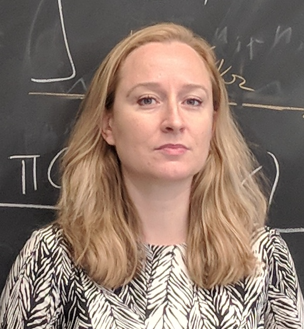Professor Dominika Zgid
Departmental Seminar
Professor Dominika Zgid
LSA University of Michigan
Department of Chemistry
Host: Professor Jason Goodpaster
Post-DFT calculations for strongly correlated solids
I will present a detailed discussion of the methods that we are developing in my group for post-DFT calculations in correlated solids. I will discuss the self-energy embedding theory (SEET) which is a quantum embedding scheme allowing us to describe a chosen subsystem very accurately while keeping the description of the environment at a lower cost. We applied SEET to molecular examples and solids, where our chosen subsystems are made out of a set of strongly correlated orbitals while the weakly correlated orbitals constitute an environment. Such a self-energy separation is very general and to make this procedure applicable to multiple systems a detailed and practical procedure for the evaluation of the system and environment self-energy is necessary.
Finally, on a set of carefully chosen periodic solids and molecular examples, I will demonstrate that SEET, which is a controlled, systematically improvable Green’s function method can be as accurate as established wave function quantum chemistry methods.
Research
We are a theory group bridging three fields, chemistry, physics and material science. Our motivation for research steams from the recent progress in experimental chemistry that enabled manufacturing new materials that can be used in a variety of industrial applications.
Semiconductors, heterostructures and thin layered films are used for energy harvesting and solar sells. Newly emerging “electron correlation” devices made out of transition metal oxide heterostructures and metallic surfaces with deposited magnetic molecules can be used for signal conversion, nonvolatile memory and spintronic devices.
Currently, this experimental progress poses many questions to our theoretical understanding. These questions should be answered in materials or molecules by design solutions using a combination of modeling and theory to support experiment.
In our group, to tackle these important questions we are developing controlled, reliable, and systematically improvable methods that describe correlation effects and are able to treat solid and large molecules realistically.
Professor Dominika Zgid
Dominika Zgid is an assistant professor at the University of Michigan. She received her Ph.D. from the University of Waterloo, Canada, in 2008. Since starting at Michigan, she has received a DOE Early Career Award in 2013 and an NSF Career Award in 2015.
Her main interests are at the interface of theoretical chemistry and condensed matter physics with a major focus on designing new, systematically improvable and controlled computational methods that can be used to study strongly correlated molecules and materials. She has worked on variety of topics, such as a molecular version of density matrix renormalization group, solvers for dynamical mean field theory using explicit bath formulation, conserving Green’s function methods for weakly correlated systems and the development of the self-energy embedding theory.
